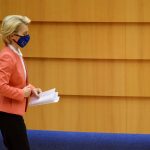Fact-based news is under assault in this world increasingly famished for enquiry, according to a summit on investigative journalism held in London.
The Sir Harry Evans Summit brought together leading investigative reporters and editors who called for more truth-telling.
Bob Woodward and Carl Bernstein, the men who uncovered the Watergate scandal, said serious journalism is indispensable.
“We have a different audience than we had then,” said Mr Bernstein. “So many of our readers and viewers are looking for information to reinforce what they already believe. They’re not open to the best obtainable version of the truth.”
The late Harry Evans was a British-American journalist and editor of the Sunday Times from 1967 to 1981. He had championed investigative reporting saying: “Things are not what they seem on the surface. Dig deeper, dig deeper, dig deeper.”
The summit took place on the eve of the first anniversary of the death of Shireen Abu Akleh, a Palestinian-American journalist killed while covering a story in the occupied West Bank.
In the days following her death, it was investigative journalism that helped uncover what happened. Journalists geo-located the spot where she was killed, examined metadata from footage of the scene and cross-checked official statements for inconsistencies.
Plaid Cymru leader Adam Price to quit after damning report into ‘toxic’ party culture
Prince Harry hacking trial: Daily Mirror publisher apologises for ordering unlawful gathering of information
Cost of living latest: Student loan costs to double; savers urged to check bank accounts; Boots slashes Advantage Points
“We would never have known the truth of what happened if journalists had not dug deep into it,” said Dean Baquet, former Executive Editor of the New York Times.
“Whenever true things don’t emerge, whenever there’s murkiness, whenever the facts are submerged, these things put a little bit of a chink in the honour of the society. The role of journalists is to restore that,” Mr Baquet told Sky News.
London-based research group Forensic Architecture had found evidence that the Israeli army targeted Abu Akleh with the intention to kill.
“The official picture of what happened very quickly began to fall apart,” said Robert Trafford, Assistant Director at Forensic Architecture.
“We were able to go much further with our investigation precisely because of the architectural techniques in our toolkit, so were able to contribute to a further collapse of that story.”
One year after Abu Akleh’s death, no one has been held accountable.
An Israeli military probe into her death concluded there was a “high possibility” that one of its soldiers “accidentally” fired the fatal shot but said it was also possible that she was killed by a Palestinian militant.
The IDF said it regrets any harm to civilians.
“Israel has been successful in getting away with these sham investigations over decades,” said Hagai El-Ad, executive director at the Israeli human rights organisation B’Tselem.
Speaking from Jerusalem, El-Ad told Sky News “This is the game plan. This is the routine way in which Israel whitewashes these crimes against Palestinians.”






















